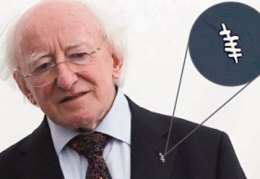DISAPPOINTMENT has been expressed over President Michael D Higgins’ decision to stop wearing an anti-racism lapel pin that he wore prominently prior to and during his presidential campaign.
Ken McCue of Sport Against Racism Ireland (Sari) said the John Rocha-designed badge symbolises five continents and one people, and that President Higgins had been a prominent wearer of the symbol up until his inauguration.
The badge was designed 10 years ago in tandem with a State anti-racism campaign known as ‘Know Racism’, and McCue said the lapel pin had proven “a good conversation piece” in terms of opening up discussions on racism.
While acknowledging that the lapel pin could be seen as tokenistic and used in that manner, McCue said that President Higgins’ known commitment to anti-racism and interculturalism during his political career made his decision to remove the symbol “disappointing”.
President Higgins’ wearing of the symbol during his campaign did not go unnoticed among members of the immigrant communities, including naturalised citizens who had the power to vote.
In a blog post just after his election victory, broadcaster and anti-racism campaigner Dil Wickremasinghe – a naturalised Irish citizen of Sri Lankan background – had described as “heart warming” the notion that “on every public appearance Mr Higgins has proudly worn an anti-racism emblem”.
While Ken McCue noted that “protocol” is likely behind the turnaround, he said it would have been appropriate for Ireland’s first citizen to take a stand on this particular issue.
He expressed further disappointment that immigrants had not been specifically referenced in President Higgins’ inauguration speech, and that no person of migrant background had been among his nominees to the Council of State.
“He was the only presidential candidate wearing the badge,” added McCue, “and now he’s naked without it. ”
A spokesperson at Áras an Uachtaráin told Metro Éireann it is “standard” for the president to wear no emblems aside from a shamrock on St Patrick’s Day.
Asked if there was a written protocol on the issue, she said it was “just a long established practice”.
There was no further information available on the absence of a nominee from a migrant background to the Council of State.












